Key takeaways
- Literacy is a crucial foundation for empowerment, enabling individuals to engage in activism and social change effectively.
- Book clubs transform reading into an interactive experience, fostering critical thinking and community among learners.
- Inclusion of diverse texts and student-led discussions enhances engagement and personal connection to literature.
- Facilitating book clubs with open-ended questions and varied activities promotes confidence and deeper understanding of texts.
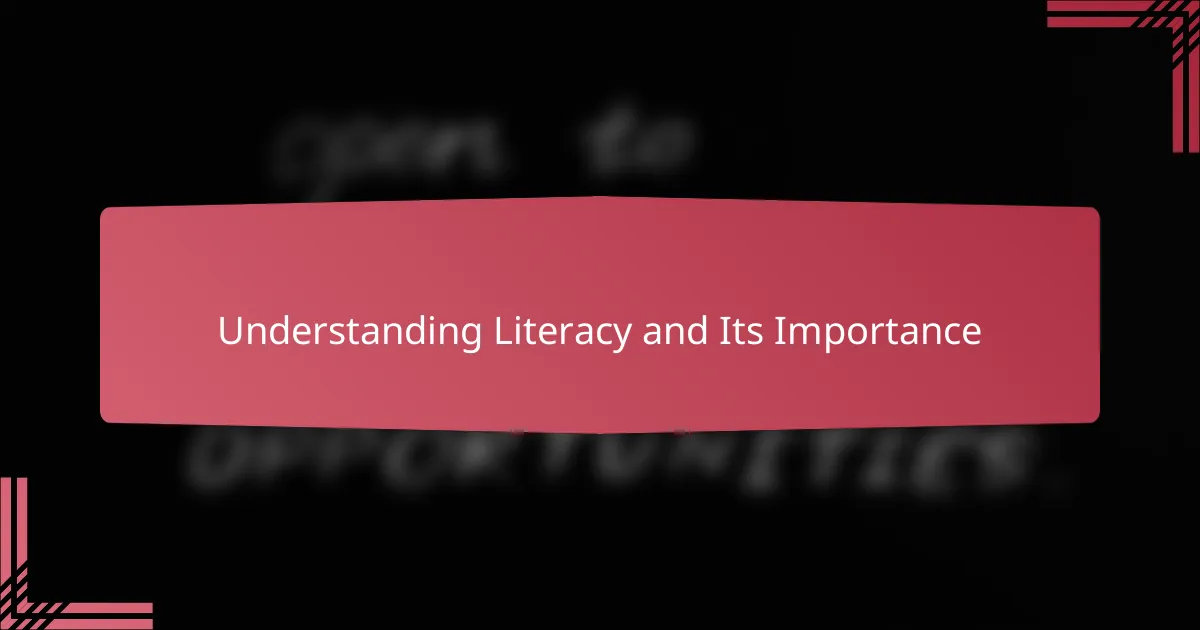
Understanding Literacy and Its Importance
When I think about literacy, I don’t just see it as the ability to read and write; it’s so much more. It’s about understanding the world, expressing ideas, and connecting with others in meaningful ways. Have you ever considered how literacy shapes the way we participate in society and advocate for change?
Growing up, I realized that literacy opens doors—it gave me the tools to question, learn, and speak out. Without those skills, how could anyone fully engage in activism or stand up for what they believe in? Literacy isn’t just a basic skill; it’s the foundation for empowerment.
I often reflect on how literacy transforms lives, not just academically but personally and socially. When students become literate, they gain confidence and a sense of agency. Isn’t that the kind of impact every educator hopes to see?
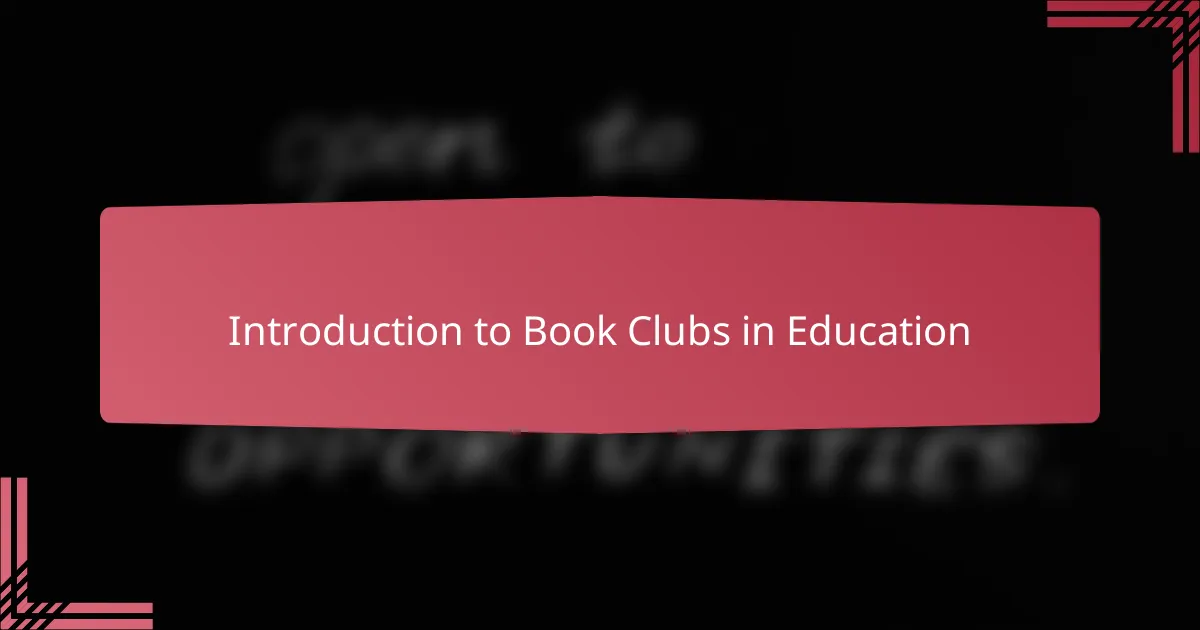
Introduction to Book Clubs in Education
When I first encountered book clubs in the classroom, I was surprised by how much more than just reading was happening. It felt like a safe space where students could share ideas, question perspectives, and truly engage with texts in a way that felt alive and personal. Have you noticed how conversations in book clubs spark curiosity and enthusiasm that lectures often miss?
In my experience, book clubs invite students to become active participants, not just passive recipients of information. It’s where literacy moves beyond decoding words to interpreting meaning and connecting it to their own lives. I remember a moment when a student, usually quiet, lit up passionately explaining a character’s struggle—it was like witnessing literacy turn into empowerment firsthand.
What excites me most is how book clubs foster a community of learners who listen deeply and challenge each other respectfully. Isn’t that exactly the kind of critical thinking and collaboration we want to nurture in classrooms, especially for those ready to take on social issues? Book clubs create a unique rhythm that classrooms often lack, making literacy a shared and dynamic journey.
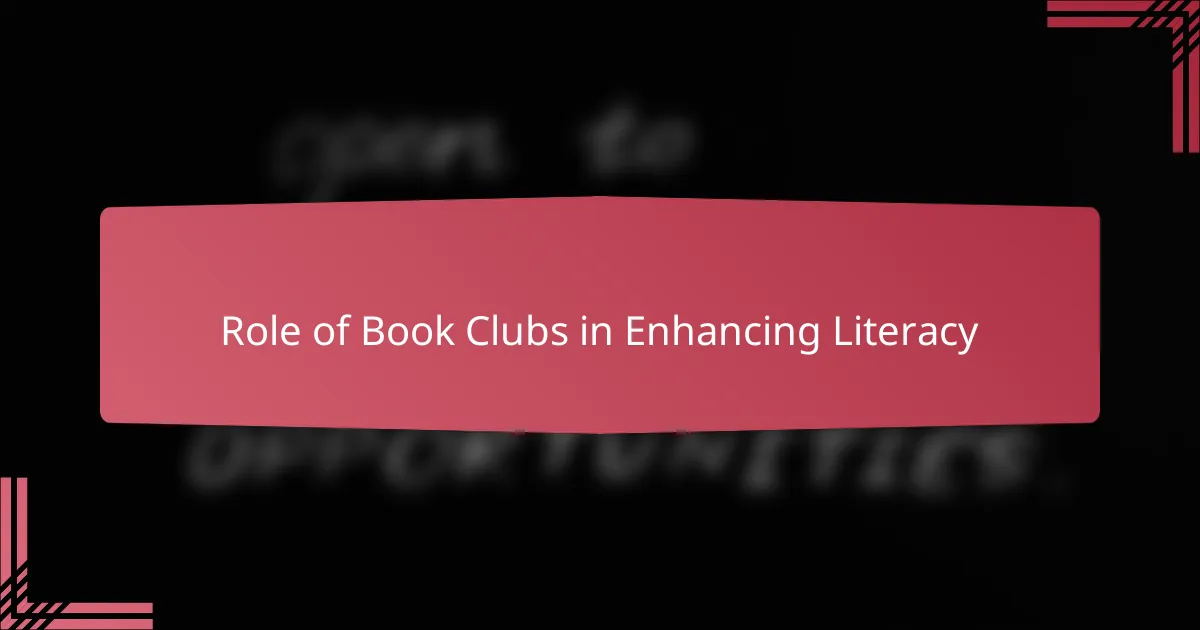
Role of Book Clubs in Enhancing Literacy
Book clubs play a vital role in enhancing literacy by turning reading into an interactive experience. I’ve seen firsthand how discussing a book with peers pushes students to think more deeply about language, themes, and ideas. Can reading ever truly be solitary when it invites such rich conversation and connection?
In those book club moments, students don’t just decode words—they wrestle with meanings and share interpretations that challenge their thinking. I remember a time when a student’s perspective shifted completely after hearing a peer’s insight, showing me how literacy thrives through dialogue, not just individual effort.
What strikes me most is how book clubs build confidence alongside skills. When students talk about books, they practice articulating thoughts and asking questions, essential parts of becoming literate and engaged citizens. Isn’t that the kind of learning we want—one that equips students to read the world as well as the text?
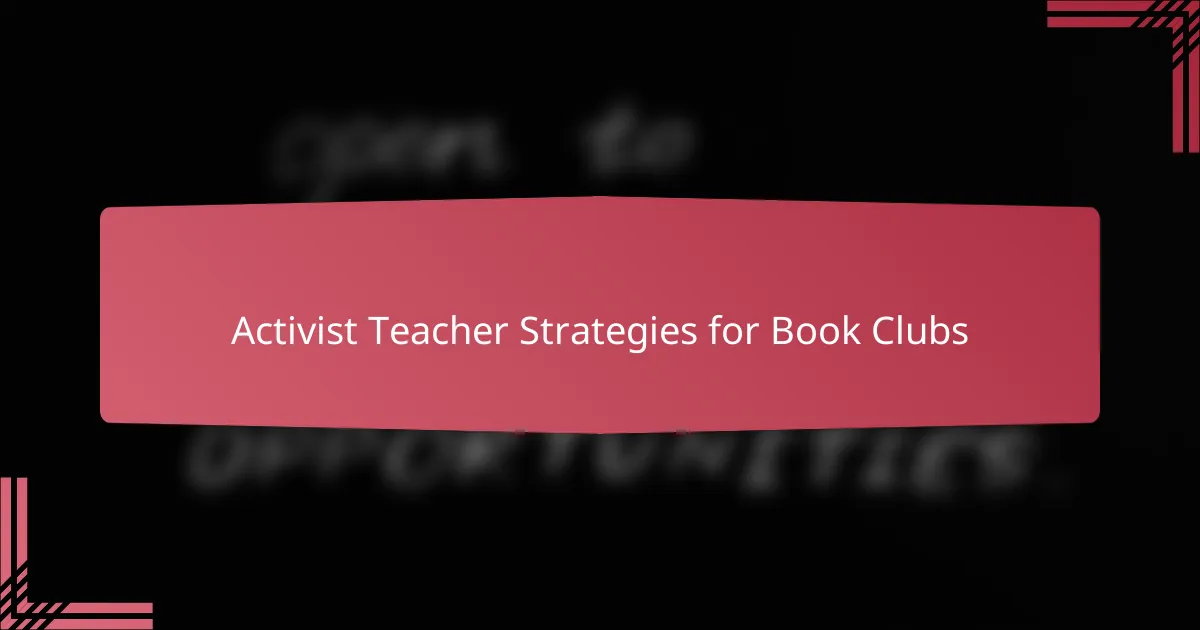
Activist Teacher Strategies for Book Clubs
One strategy I find powerful is selecting books that resonate with students’ lived experiences and social realities. When students see their own stories or struggles reflected on the page, it sparks a deeper investment. Have you noticed how a book that validates identity or challenges injustice turns reading into a passionate conversation rather than a task?
I’ve also seen how framing book clubs around guiding questions related to social justice encourages students to connect literature with activism. Instead of merely summarizing, students start to ask, “What does this mean for our community?” This shift in questioning transforms discussions into opportunities for critical thinking and collective empowerment.
Creating space for student-led discussions is another key approach. When students take ownership of the conversation, they become leaders, not just participants. I recall a group where a usually reserved student gained confidence, steering debates on equity and fairness—moments like these show me how activism and literacy can grow hand in hand through book clubs.
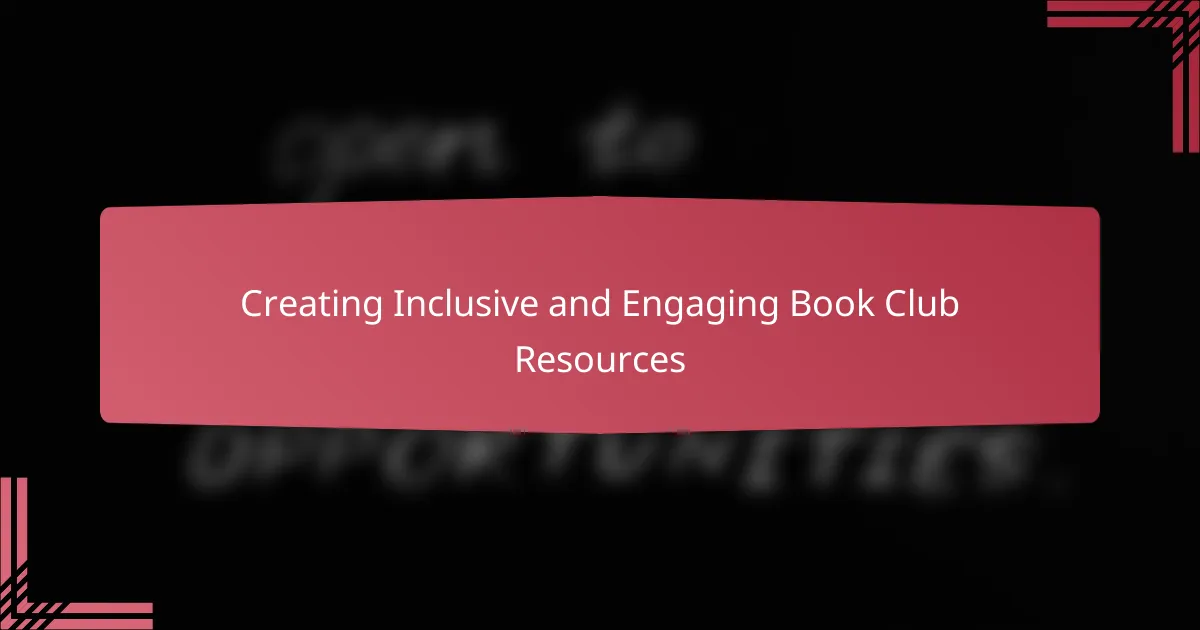
Creating Inclusive and Engaging Book Club Resources
Crafting book club resources that everyone feels welcomed by isn’t just a nice idea—it’s essential. I remember a time when I introduced diverse texts that reflected my students’ cultures and experiences, and suddenly, the discussions became more vibrant and honest. Isn’t it incredible how inclusion can turn a simple reading assignment into a powerful moment of connection?
Engagement also hinges on the materials we provide—questions that open doors rather than close them, activities that invite creativity instead of conformity. I’ve seen firsthand how open-ended prompts encourage students to explore their own ideas and relate texts to real-world issues. When was the last time you witnessed a student’s eyes light up because a question made them think, “Hey, this matters to me”?
Finally, it’s about creating flexible resources that honor different learning styles and voices. I once designed a resource packet with visual, auditory, and written components, which helped quieter students find their stride alongside talkative peers. Isn’t it rewarding to watch a group where every voice has a chance to shine, making literacy not just a skill but a shared celebration?
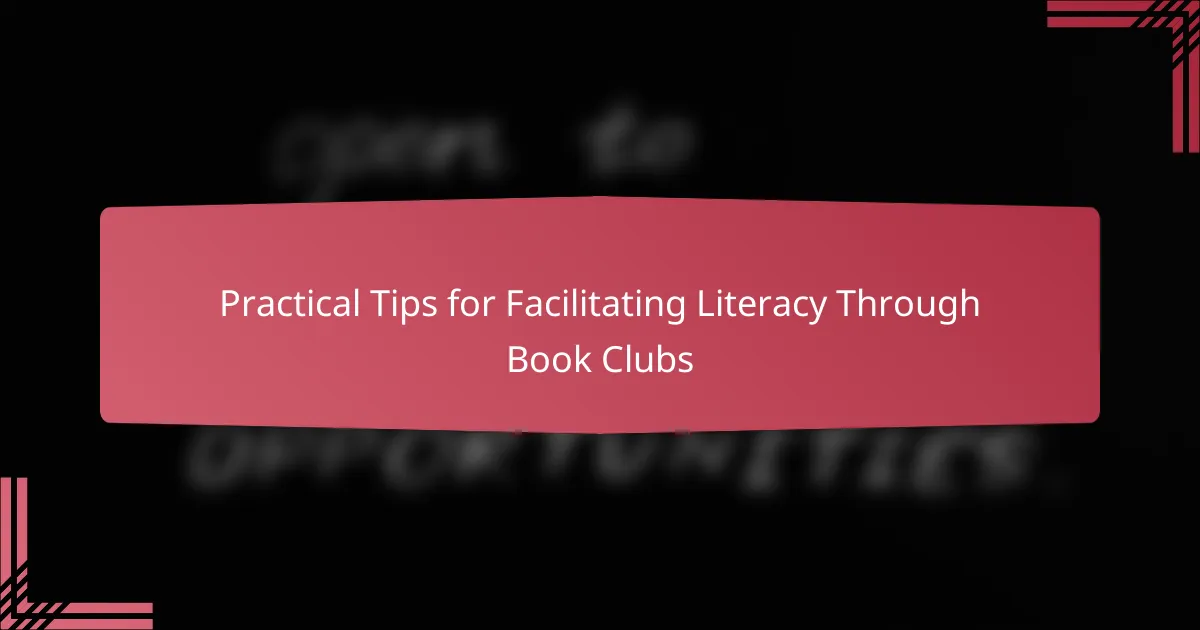
Practical Tips for Facilitating Literacy Through Book Clubs
Facilitating a book club for literacy is all about creating a space where every voice feels valued and heard. I’ve found that setting clear, open-ended questions before each session helps guide the conversation without boxing it in. Have you noticed how, when students know the questions ahead of time, their discussions become more thoughtful and less surface-level?
Another practical tip is to encourage students to bring their own questions and reflections to the group. I once witnessed a quiet student suddenly spark a lively debate by asking something simple yet profound about a character’s choice—moments like that show how empowering it is when learners lead the discussion themselves. Isn’t it rewarding to see confidence grow alongside literacy skills?
Finally, mixing up formats keeps things fresh and engaging. I like to incorporate activities like role-plays, creative responses, or even digital storytelling. These variations let students connect with texts in different ways, appealing to diverse strengths. Have you tried giving your book club members more than just a traditional discussion? It can make all the difference in sustaining enthusiasm and deepening understanding.
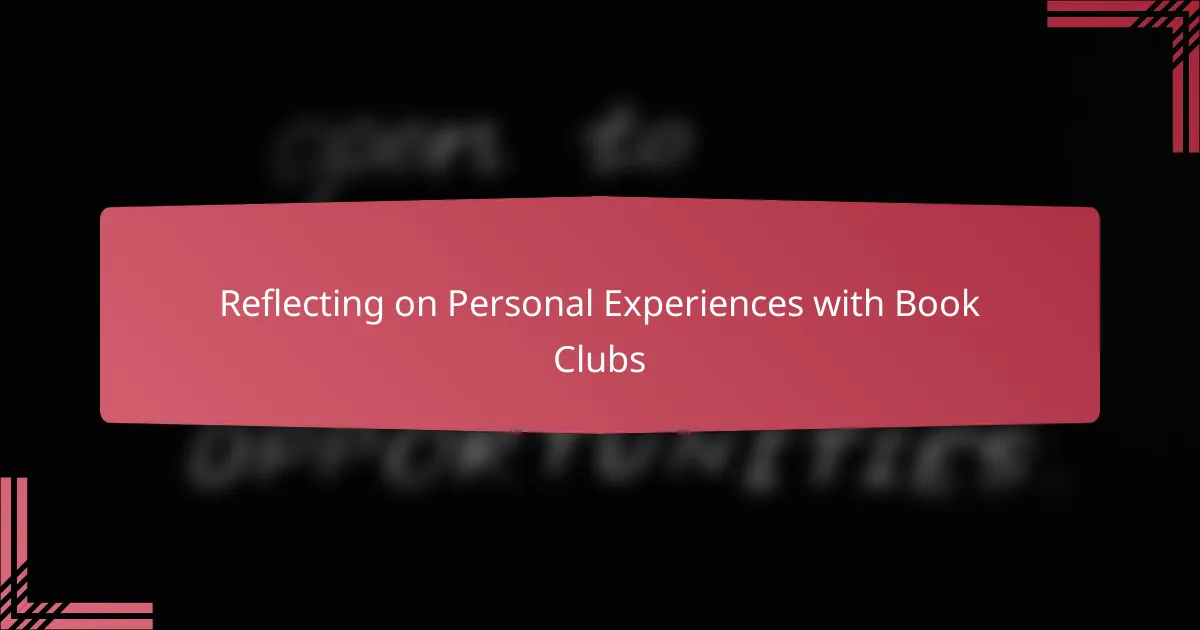
Reflecting on Personal Experiences with Book Clubs
Reflecting on my own time participating in book clubs, I’ve noticed how these spaces often become a mirror for my own growth as a reader and thinker. There was this one book club meeting where a discussion about a difficult topic pushed me to reconsider my assumptions, and that moment stuck with me. Have you ever felt that a conversation about a book changed not just how you understood the story, but how you saw the world?
I also remember the mix of excitement and vulnerability that comes with sharing my thoughts in a book club setting. It’s rare to find a group where differing opinions are welcomed, and that openness creates a unique kind of literacy—one that’s as much about listening as it is about speaking. In that environment, I realized literacy is truly a social act, a way to connect and grow with others.
Sometimes, it’s the smaller moments that resonate most. I recall a quieter member of our group who, over time, gained confidence and began offering powerful insights that shaped our discussions. Witnessing that transformation reminded me why book clubs are more than just reading groups; they’re places where voices find strength and literacy blossoms in unexpected ways.